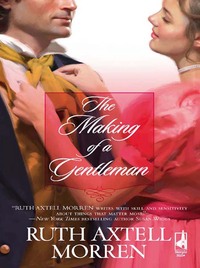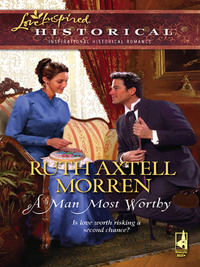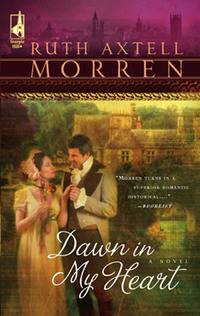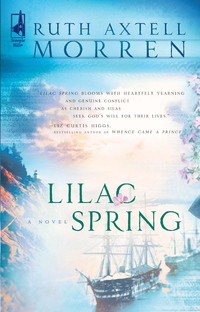
Полная версия
Wild Rose
Caleb nodded, wondering when anybody had been by his place to notice his garden.
“Didn’t evah get your house finished, did ya?” the red-bearded man asked when Caleb didn’t volunteer any more information.
“No.” Caleb moved to examine the fishhooks at one end of the store. “But it’s fine for myself.”
“Ain’t too lonely for ya, after Boston?” one of the men in overalls asked from around his pipe.
Caleb shook his head without offering any comment.
“You could always knock on your neighbah’s door if you’re hankerin’ aftah some company,” the man with plump fingers laced atop his belly suggested. He seemed the boldest of the three, if the angle of his tilted chair was any indication.
The other two chuckled. “Hankerin’ after a bullet in his chest, you mean,” Bib Overalls put in.
“’Less, o’course, she was particularly ornery that mornin’ and aimed lowah,” Red Beard added, punctuating his remark with a well-aimed stream of tobacco juice at the spittoon.
All three men, as well as Mr. Watson, laughed at the implication.
“First he’d have to get past Jake,” Bib Overalls warned.
“Ain’t as if no one around here hasn’t tried to get past ol’ Jake.” Plump Fingers angled a sly look at Red Beard. “Remembah the time Elijah tried to sneak into her shack after dark? Wasn’t long aftah her pa passed on.” The others nodded, chuckling at the story to come. “Came back out in short ordah, a hole shot clean through his straw hat. We ribbed him some about that hat.” Plump Fingers slapped his knee, and the others laughed at the memory.
“I think ol’ Elijah learned his lesson,” Red Beard said with a nod of his head, shifting the tobacco from one side of his mouth to the other.
“I’ll wager not everyone’s learned his lesson.” Plump Fingers lifted his sandy-haired fingers and stared at them, then looked across at Red Beard.
“I ain’t heard o’ no man who’s snuck past ol’ Jake at night, though it ain’t been for lack of wantin’,” Red Beard answered placidly, but with a gleam in his eyes that testified of his own desires in that direction.
“Gotta be careful o’ Ginny. Her ol’ man had a mean streak a mile wide and I think she inherited a good portion of it,” Mr. Watson explained to Caleb.
“She probably needs it, by the sounds of things,” Caleb said quietly, looking at the three men around the stove as he spoke.
All three chairs stopped rocking and hung tilted in midair as the men stared at Caleb. He could hear the murmur of the lady and Mr. Watson behind him die down.
Bib Overalls’ chair was the first to resume its rocking. “I think Genevar’s just waitin’ for someone who’s man enough to tame her,” he said, pointing his pipe first at Red Beard and then at Caleb. “What do you think, Cap’n?”
Red Beard’s smile had something nasty in it. “The cap’n has already lost one good woman. Just think, if he was to get turned down by Salt Fish Ginny, how’d he be able to lift his head up in public?” He slapped his knee and chortled. The other two men laughed more guardedly, awaiting Caleb’s reaction.
“It’s been my experience that the more a man boasts about his conquests, the less they exist in truth,” Caleb commented, leaning his back against the counter.
All the men except the red-bearded one laughed heartily.
When their laughter subsided, Mr. Watson smiled. “We’ve got some fresh eggs. Would you like me to add a dozen to your order?” he asked Caleb.
Caleb turned back toward the shopkeeper. “Half a dozen will do.”
“It’ll cost you more that way. Two bits a dozen, but fifteen cents for half.”
“I’ll take the half,” Caleb repeated.
When he faced the room at large again, he discovered the topic of Miss Patterson was by no means exhausted.
“You mustn’t blame Geneva for the way she’s turned out,” the woman from the other end of the counter piped up. “She used to be black and blue from the beatings her pa give her. It’s no wonder she’s unfriendly.”
Deciding he’d had enough village gossip, Caleb moved away, hoping that would end the subject. Looking at several stacks of denim overalls, he began to finger through them until his order was filled.
“Those are fine quality denim. Just the thing for gardenin’. Is there a particular size you’d like to look at?” Mr. Watson came to stand behind the stacks of trousers.
“Is my order ready?”
He watched the friendly expectancy on the shopkeeper’s face turn to surprise and end in frosty politeness. “Yes, of course. Is there anything else you be needin’ today?”
Caleb shook his head and walked back to the center counter.
“The way ol’ Jeb Patterson kept her out of school, it was disgraceful,” the woman said. “We tried to reason with him, but anytime anybody would come by, he’d wave that shotgun at us from the doorway, and all his hunting dogs would bark something ferocious. There was nothing to do but leave him to his own devices.”
Caleb watched Mr. Watson add the column of numbers on a piece of paper. He didn’t want to hear anything more about Geneva Patterson. The men’s conversation sickened him. He’d been curious about her. He’d realized the other day that she wasn’t as self-assured as she’d first appeared to him. She was also kinder-hearted than her gruff manner suggested. It was evident in her manner toward her dog.
He’d been intrigued about why she dressed like a man and hid any feminine charms she might possess. Now he understood why.
“And her mother, poor woman, Canuck—”
“Half-breed,” Bib Overalls put in. “Woman could barely speak English.”
Caleb ignored their talk. He paid his bill, aware of the silence that had returned to the store, knowing everyone was just waiting for him to leave so they could begin commenting on his past.
He put his hat back on at the door, tipping it to the general company. “Good day.” He heard the door bang behind him as he walked down the worn steps.
After he had arrived home and put everything away, he felt at loose ends. The fog had lifted but the day remained cool and overcast. Without a conscious decision, he found himself directing his feet back up the hill toward Miss Patterson’s. He’d seen her working in her front yard when he’d passed. He had no valid reason for visiting, but something drew him.
Jake started barking the moment Caleb came in sight. As he came up the path, the dog ran up and down alongside him.
“Hello, boy. Whatcha got there?” He examined the old buoy Jake had brought him.
Miss Patterson, her back toward him, was sawing a board on a sawhorse. Caleb went up to her and pushed her gently aside. “Here, let me do that for you.”
She jumped when she felt his touch. “Hey, what’re you doin’?” she demanded when his hand touched the handle of the saw.
“I can finish it for you.”
She scowled. “I can do it fine myself.”
“Give me that,” he insisted, trying to pry the handle away from her. Her fingers only tightened on the handle as she attempted to continue the sawing motion. They began a brief tug-of-war for the saw, but when Caleb realized how ludicrous it was, he let go and stepped back.
“Did anyone ever tell you you’re about as stubborn as a mule?”
“When they bother to talk to me, yes,” she answered shortly above the rasp of the saw.
At the words, Caleb felt a curious link with her. He knew how it felt to be singled out. He shook his head, never having imagined in Boston that one day he’d find something in common with a person such as Geneva Patterson. Taciturn, ornery, proud…
Caleb thought about what he’d heard at the store. He found it hard to fathom the men’s salacious gossip. If there was a spark of femininity in Miss Geneva Patterson, he couldn’t see it. He stepped back and watched her finish sawing the board. Without a word she carried it past him, to the front stoop, where she’d already pried off an old plank.
Carefully she placed the new board over the hole and lined it up with the rest of the steps. She took some nails from a piece of paper and picked up a hammer from the grass. As usual she was wearing that beat-up old hat, so Caleb couldn’t see much of her profile. Her eyes were fine, really, not black as he’d supposed, but deep brown, as he’d seen the other day in the light, like polished mahogany, and fringed with inky black lashes. They were about the only feminine feature she possessed, besides the braid that fell down her back like a black rope.
She had on her habitual flannel shirt, buttoned to the very top. His gaze wandered farther down. The bib of her overalls curved over her bosom. The baggy pants didn’t reveal much of her legs; he imagined they must be long and slim, like her arms and fingers. He remembered her gentle strokes over Jake’s fur.
The only woman he could really compare her to was Arabella, and the two were so different it hardly seemed a fair comparison. Caleb watched Miss Patterson’s long fingers position a nail and grip the hammer. Whack!
When she’d pounded in the first nail, she suddenly took off her hat and wiped her forehead with a sleeve. She didn’t put the hat back on, but proceeded to line up another nail on the board.
Her hair was pulled straight back into that one long, thick dark braid, giving credence to the gossip that her mother was a half-breed. She had high cheekbones, as well. But her looks were just as much Gallic—pale skin and dark hair and eyes—reminding him of the women he’d seen at the ports of Bordeaux and Marseilles.
The only thing relieving the sharpness of her features was the widow’s peak above her forehead. It occurred to Caleb that she used her entire mode of dress to hide behind. With those men hanging around like a pack of hungry wolves, she probably had no choice.
Caleb’s eyes narrowed as a memory teased the edges of his mind. Suddenly it came to him—a young woman tripping at the wharves, spilling all her vegetables, the last time he’d come to Haven’s End. On that occasion he’d played the gentleman, coming to her aid.
Before he could recollect further, Miss Patterson spoke without looking at him. “What’re you starin’ at?”
“Nothing. I’m just admiring your work.”
“If you’re so all fired to do some carpentry, why don’t you finish that mausoleum of yours?”
Her words brought him up short. “An apt description,” he said, glancing at the house he had planned with such enthusiasm. “Is that what they’re calling it around here?”
She didn’t look at him from where she was kneeling at the steps, but he could tell he had her attention. She took a nail out of her mouth, her eyes focused on some point on the steps, and replied in a mumble, as if she were ashamed to admit it. “I just heard the word used once. Folks were sayin’ as how you’ve buried yourself in the place.”
He said nothing, but watched her position the nail on the board. Above the intermittent whack of the hammer, he heard her words. “They say your lady—” bang! “—broke off the engagement.” Bang! “What’s the matter?” Bang! “She decide—” bang! “—she preferred someone else—” bang! “—after you run into your troubles in Boston?”
Silence.
To his own surprise he found himself answering as he watched her pick up another nail from the paper. “As a matter of fact, she did.”
He wasn’t sure if she could hear his quiet words, but her immediate reaction told him she had. She looked up at him, hammer and nail forgotten, her expression stunned as if that was the last thing she’d expected to hear.
“You’re serious.” Her words were as quietly spoken as his own. At his nod, she remained silent a moment, as if truly stumped for the first time.
Finally she just shook her head. “Don’t fret, Cap’n,” she said softly. “The woman’s clearly got no sense.” With those words she turned back to her work.
Caleb was amazed to feel no resentment at her tone of sympathy. In fact, he actually felt comforted. He didn’t have the foggiest idea how some rustic, uneducated woman’s simple words could reach him. Perhaps because for the first time in his life he felt someone’s complete acceptance of him. Even with his friend, Nate, Caleb had struggled to prove himself since the day they’d met. Caleb had been a lad of eight, and Nate, at thirteen, had appeared to him a hero. Caleb had been playing catch-up ever since.
But with the woman kneeling at the steps in front of him, there was no censure, no judgment, and no expectations he had to fill. It didn’t seem to matter to Miss Patterson what his background was, whether he was innocent or guilty of wrongdoing. She accepted him just as he presented himself. No past, no gossip, no stories that had reached her ears seemed to affect her opinion.
Caleb had never experienced this kind of acceptance, and he didn’t know quite what to make of it.
The next day Caleb was thinning his thriving seedlings when he heard Jake’s bark. He turned, amazed to see the dog bounding across his yard making straight for him. The bark sounded exuberant, and Caleb sat back, curious to see what his neighbor and her dog were coming for. Geneva walked more slowly behind her pet, slower than Caleb had ever seen her walk. She always seemed so purposeful, and today, he’d venture to say, she approached hesitantly.
Caleb had begun calling her Geneva to himself. He liked the sound of it. It suited her.
Jake ran around Caleb, and Caleb turned, afraid the dog would step on his new plants, but Jake didn’t even touch the edge of the soil. Caleb glanced up at his mistress, realizing, despite appearances, how well trained the dog must be.
Geneva was carrying a basket in one hand. When she stopped, still a little distance from him, Caleb pushed his hat back. “Good morning. Come to inspect your little ones?”
She looked surprised at his remark. “What’s that supposed to mean?”
He made a motion with his head toward the row of plants. “You’ve got a stake in these crops. I expect you want to see how they’re doing.”
She flushed. “’Course not. They’re yours.”
After a short silence, he said, “I wish there was something I could do for you in return. You’ve helped me immeasurably. If you hadn’t come over that first day, I’d have nothing but a big weed field by now and a sore back.”
She shook her head. “I didn’t do nothin’ special.”
“I wouldn’t be too sure of that,” he answered. Their gazes met, and he realized she was the only villager who hadn’t once looked at him as if he were guilty. “Thank you.”
She gripped the handle of her basket with her two hands, clearly uncomfortable with his gratitude. He knew he’d offend her if he offered her money in payment for her help. “What have you got there?” he asked to distract her.
“This?” She looked down at the basket before holding it out to him. “Brought you some strawberries. They’re wild, my crop’s not ripe yet. But these are better anyway. Sweeter.”
To ease her obvious embarrassment, Caleb stood and took the basket from her. Inside, nestled in some hay, sat a dish full of the reddest, tiniest strawberries he’d ever seen. He popped one into his mouth, smiling at the burst of sweetness and juice. “These are good. Where did you pick them?”
She motioned off to a field up the road. “Up there by the edge of the woods. I’ll show you, if you like.”
“They probably make good jam,” he added, still hoping to put her at ease.
She nodded and looked toward the ocean. “I just picked ’em this morning. Thought I’d bring you some.”
Caleb’s eyes narrowed in sudden suspicion. “You wouldn’t be taking pity on me now, would you, after what I told you yesterday?”
Her reddened cheeks made her look so guilty, Caleb felt sorry immediately. Clearly she wasn’t used to offering a person comfort.
Her denial came swiftly, cutting off any chance Caleb had of making amends. “Ain’t none of my business why you’re here or what your lady done to you.” She stuck her hands in her back pockets and looked down at the toes of her boots.
“Forget about all that. It doesn’t matter anymore anyway.” Caleb set the basket down on the ground, then straightened, rubbing his two hands together, deciding it was better for both of them if he changed the subject. “I’d like to repay you for all the help you’ve given me with the planting. You seem bound and determined not to let me help you with any physical labor. Isn’t there anything I can do for you, in return for all you’ve done for me?” He laughed ruefully and gestured toward the basket. “Including these beautiful berries you picked for my breakfast?”
“You don’t have to do nothing for me.”
“I know that. But neither do I want to be in your debt. I’ll never feel I can ask you another favor, not even to show me exactly where you picked these berries—”
“You could teach me to read,” she blurted out before he could finish persuading her.
“What?” She’d said it so fast, he wasn’t sure he’d heard correctly.
She continued looking stubbornly at her feet. “You heard me.”
Caleb hid his surprise and said in a neutral voice, “I thought I heard you say I could teach you to read.”
“That’s right.” She began tapping one foot, as if at any moment she’d be off.
“I’m not sure whether I could teach anyone to read or write,” he said carefully.
She finally looked at him, jutting out her chin. “What’s the matter? It’s not too difficult, is it?”
Her tone was belligerent, but that didn’t fool Caleb. He realized what treacherous ground he was treading on. “No, it’s not too difficult. It’s just that you have to be specially trained to teach someone to read.”
Her focus returned to her feet. The toe of the boot that had been tapping now began to dig into the dirt. “You think I’m too stupid to learn.”
Caleb held back a sigh. Whatever he said would probably be wrong. “I think you’re very intelligent.”
At that she looked at him.
“I’m the one who’s probably too stupid to teach you. It’s like planting. Did you think it would be so easy to teach an ignorant seaman to plant a garden?”
She considered, then shook her head. “But I did, didn’t I?”
Poor example, he said to himself. To her he said, “Yes, you did, and you did a fine job. Except for neglecting to warn me about those cutworms.” He let out a breath at seeing her reluctant smile, a smile that transformed her from dour farmer to fresh-faced lass.
Against his will, knowing it would probably end badly, he said with a sigh, “If you’re willing to risk it with me, I shall try to teach you. Only, I don’t guarantee anything. You must promise me that if I can’t teach you, it doesn’t mean you can’t learn, just that I’m not a very good teacher. Is that agreed?”
She nodded.
“I only have a few books and they wouldn’t be suitable—technical things on sailing.”
“That’s all right,” she interrupted. “I have a book.”
He raised an eyebrow.
“It was my ma’s.”
He wondered what kind of woman her mother had been. He’d heard about her father from the villagers, but he hadn’t heard much about the maternal influence in her life. Whatever it had been had made an impact, judging by the reverent tone of voice she used when she mentioned her mother’s book.
“Good enough,” he agreed. “It’s settled.” He held out his hand.
After a second’s hesitation, she brought forth her own hand. He felt the long, slim fingers wrap around the edge of his palm, and he remembered once again their soft touch upon her pet.
“Bring the book this afternoon and we’ll start with our first lesson.”
Geneva took the cloth off the rough-hewn chest and lifted the lid. The pungent smell of cedar brought back a sharp reminder of her mother. Geneva had knelt at her feet whenever her ma had opened the chest. Geneva’s pa had made the chest for his bride, and in it she’d kept the few items of her former life. Over the years, her mother had added the quilts she’d made. Geneva lifted those out first, remembering her mother’s hands as she’d sat in her rocker and sewed the squares together. Bits of pale yellow and lavender and moss green formed a pattern of flowers against a white muslin background.
Next came a couple of woolen sweaters her ma had knitted for herself and her husband. Geneva often wore them in winter now. There at the bottom of the chest lay her mother’s few personal possessions—some old dresses, the cloth worn thin from so many washings. Geneva had never been able to bring herself to cut them up for rags.
Geneva’s hand smoothed the brown wool skirt of her mother’s best dress, the dress she’d been married in. She and Pa had married in November. The sisters at the convent had made the dress for her. That was the last thing they’d given her before sending her back out into the world. They’d received her as a little girl, from her Indian father who’d just lost his white wife.
Geneva set the dress aside. Below it was a thick roll of fabric, which her mother had purchased for a new dress. She remembered her excitement as a little girl that last spring before her mother had become bedridden, as her mother told her she’d bought enough fabric to make a dress for the two of them for summer. She’d told Geneva they’d be like twins instead of mother and daughter. The fabric had remained in one piece and would probably stay that way until it began to crumble at the folds with decay.
Geneva pushed aside the fabric and uncovered the object she’d come to get. A soft, brown, suede-bound volume with gilt letters. Geneva opened the book upon her crossed legs. Neatly printed letters in black upon white. She could recognize most of the letters, but could make nothing of the groupings. She’d tried and tried over the years.
What had made her think that this time it would be any different? What had possessed her to ask the captain to teach her to read? She could feel the heat suffusing her face as she thought once again of her request. The captain had acted so cordial. He’d seemed practically like his old self, the man she remembered on the wharf, so genuinely interested in doing something for her. But to spill out her most shameful secret? What had possessed her?
Having already spent the day agonizing over her behavior that morning, Geneva gave herself a shake and replaced everything in the chest, except the book. She stood and straightened her shoulders. She’d already washed her hands and face and combed her hair and changed her shirt. There was nothing left but to face the situation head-on. She gripped the book and marched to the door.
The afternoon sun was still high in the sky, causing the ocean at the end of the Point to shimmer in a thousand brilliant lights. Geneva could list a dozen things she should be doing instead of whiling away the afternoon poring over a book.
Jake started to follow her. “No, boy. You’d best stay home,” she told him, giving her yard a look of longing. How much she’d give to take her foolish words back and spend the afternoon on her soil, with the things she knew. “Your mistress has got to have all her wits about her this afternoon.”
Jake was no longer listening to her words. He turned his head away from her and began to bark. Geneva followed his gaze.
She stifled a sigh of annoyance at seeing her neighbor, Mrs. Stillman, bearing down her way, carrying a bundle wrapped in a dishcloth.
“Geneva!” Mrs. Stillman’s shrill voice reached her from the road.
Geneva sighed again and walked to meet the woman.
“Good afternoon.” Mrs. Stillman’s voice was breathless from her hike down the road.
“Afternoon.” Geneva remembered too late that she was still holding her mother’s book. She didn’t know whether to rest it on the stone wall in back of her, or just hang on to it, hoping it would go unnoticed. She decided the less movement she made with it, the better.
“You haven’t been by to collect any milk.” The farmer’s wife readjusted one of the pins in her abundant gray roll of hair. “I brought you some fresh butter. Sarah just churned it this morning.”
Sarah was Mrs. Stillman’s oldest daughter and Geneva’s age. Geneva had detested her since the two had walked to school together and Sarah had whispered things to her sisters, pointing and giggling at Geneva the whole way.











